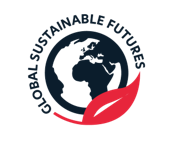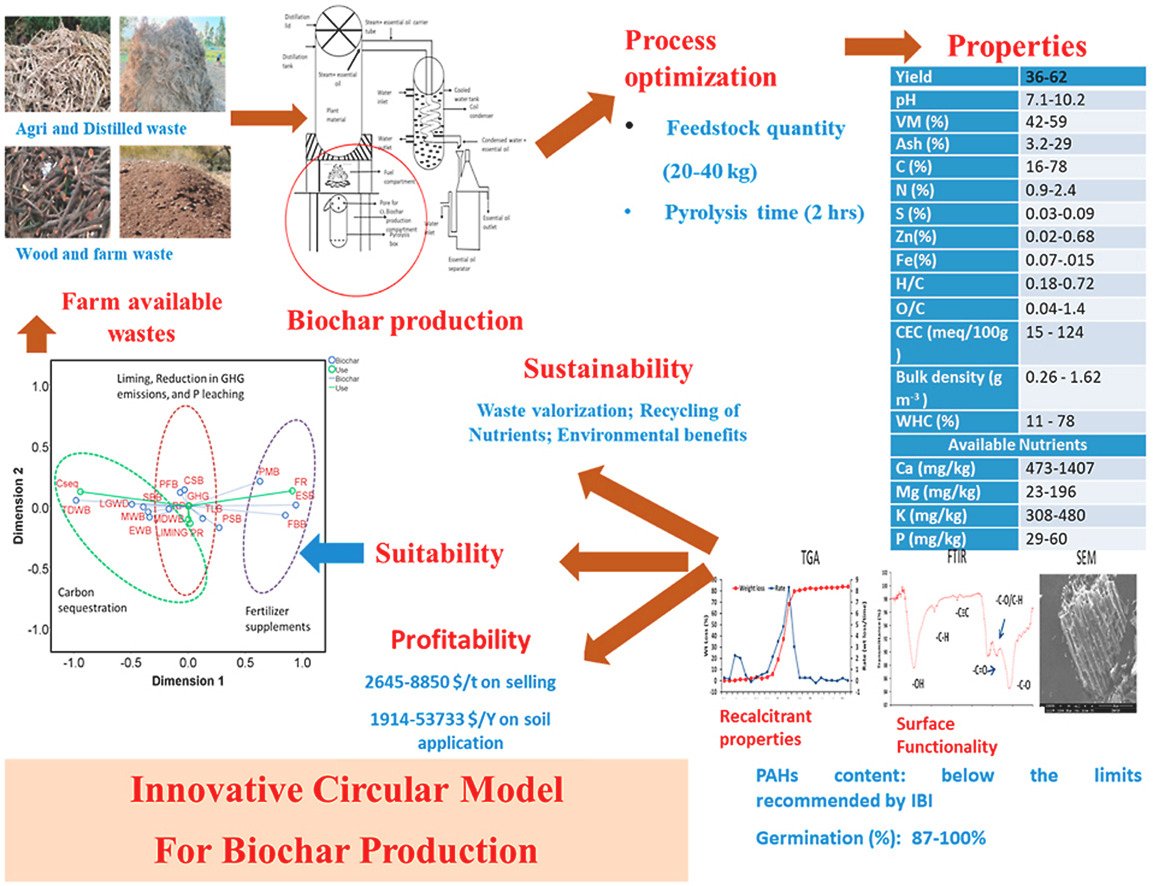Picture: Ahsan, M., Singh, M., Singh, R.P., Yadav, V., Tandon, S., Saikia, B.K., Karak, T. and Khare, P., 2022. An innovative circular model for recycling the wastes into biochar using distillation units. Journal of Cleaner Production, 361, p.132258.
Responses to questions in the webinar focusing on the socio-economic and humanitarian sector by Dr Renuka Thakore, Founder & CEO, Global Sustainable Futures Network CIC.
1. How do your programs integrate circular economy practices (e.g., waste reuse, repair economies, local materials) into livelihoods and community development?
GSFN actively integrates circular economy principles by empowering smallholder farmers and local communities with practical knowledge in resource efficiency and reuse. Our Green Skills Development programs equip technical and vocational training providers (TVETs) and youth with hands-on competencies in waste reuse, upcycling, composting, and bio-based materials. The 20 Million Farmers Initiative encourages regenerative farming practices, agroforestry, and composting from crop residues, reducing dependency on external inputs. Our capacity building workshops also support micro-enterprises in developing circular value chains, such as organic fertilizers from farm waste and local repair economies for farming equipment—ensuring sustainable livelihoods while reducing environmental footprints.
2. Can carbon financing be a viable way to support community-based circular economy initiatives in the Global South? Why or why not?
Yes, carbon financing presents a high-potential pathway for funding circular economy projects in the Global South. Initiatives like community composting, regenerative agriculture, and sustainable waste management can generate verified carbon credits under emerging methodologies that value avoided emissions and soil carbon sequestration. Through the 20 Million Farmers Initiative, GSFN helps cooperatives and farmers become eligible for Voluntary Carbon Market (VCM) participation by offering technical assistance, MRV training, and support in accessing carbon registries. By monetising these climate-positive actions, communities can reinvest earnings into expanding circular practices, creating a sustainable financial loop for development and environmental stewardship.
3. Have you encountered examples where circular practices (e.g., community composting, informal recycling sectors) led to measurable emissions reductions that could qualify for carbon credits?
Yes. Through pilot projects under the GSFN umbrella, we’ve supported agro-composting cooperatives and community-led biochar initiatives that have shown measurable emissions reductions by diverting organic waste from open burning and landfills. For instance, programs promoting community-level composting of agricultural waste have demonstrated potential for soil carbon enrichment, which qualifies under certain VCM-approved carbon methodologies. Similarly, informal recycling efforts in urban areas, supported through our Green Awards Program, have led to avoided methane emissions and energy savings. These efforts can be strengthened and verified for carbon financing with proper methodology alignment and technical support—something GSFN actively facilitates.
4. How do circular economy models impact gender equity, health outcomes, or resilience in the communities you support?
GSFN’s circular economy programs are designed with inclusivity and resilience at their core. Women and youth are prioritised in all our training and enterprise support models, ensuring equitable participation. Through green skills training and entrepreneurship support, many women have started microenterprises in composting, recycling, and upcycling. These practices reduce household waste, improve sanitation and health outcomes, and generate additional income. By promoting community resilience, especially among rural and peri-urban populations, circular economy models foster resource sovereignty and reduce reliance on volatile input markets. In times of climate shocks or supply chain disruptions, such localised, regenerative systems offer enhanced adaptability and well-being.
5. How can indigenous knowledge, informal labour, and local innovation be better integrated into formal carbon-credit systems and circular economy models?
Indigenous knowledge and local innovation are foundational to sustainable land use and biodiversity stewardship. Through the 20 Million Farmers Initiative, GSFN recognizes and documents traditional practices like agroforestry, organic composting, and seed-saving—ensuring these are validated in carbon credit methodologies and circular economy models. By building capacity through vocational training and awarding grassroots innovators through the Green Awards program, GSFN elevates informal labour and local practices to formal recognition. We work with technical partners to translate these practices into measurable carbon outcomes, ensuring they are not only preserved but scaled within internationally accepted frameworks.
6. Do you see risks in over-relying on carbon credit systems that may prioritise emissions reductions over long-term local sustainability or social justice?
Yes, over-reliance on carbon markets can lead to a narrow focus on quantifiable emissions reductions, sometimes at the expense of local ownership, equity, and broader ecological regeneration. GSFN addresses this by designing carbon projects that are co-created with communities and embedded in long-term development goals. For example, our approach prioritises farmer income, green skills development, food security, and biodiversity protection alongside carbon sequestration. Circular economy models—like our recycling and regenerative agriculture training—ensure that benefits are multidimensional and sustainable, not just emissions-driven. Social justice and local sustainability are built into our metrics and incentive structures from the outset.
7. What role should humanitarian organisations play in shaping future carbon markets to reflect circular, just, and inclusive climate solutions?
Humanitarian organisations have a critical role in ensuring carbon markets do not marginalise vulnerable communities but instead catalyse inclusive development. GSFN collaborates with such organisations to integrate climate action with livelihood support, especially for smallholder farmers, women, and youth. Through initiatives like vocational green skills training, recycling programs, and capacity-building in carbon farming, we help communities build resilience while accessing new income streams. Humanitarian actors can advocate for equity-based carbon standards, support transparent benefit-sharing models, and co-develop verification systems that include non-monetary local outcomes—thereby grounding the carbon economy in justice and circularity.






